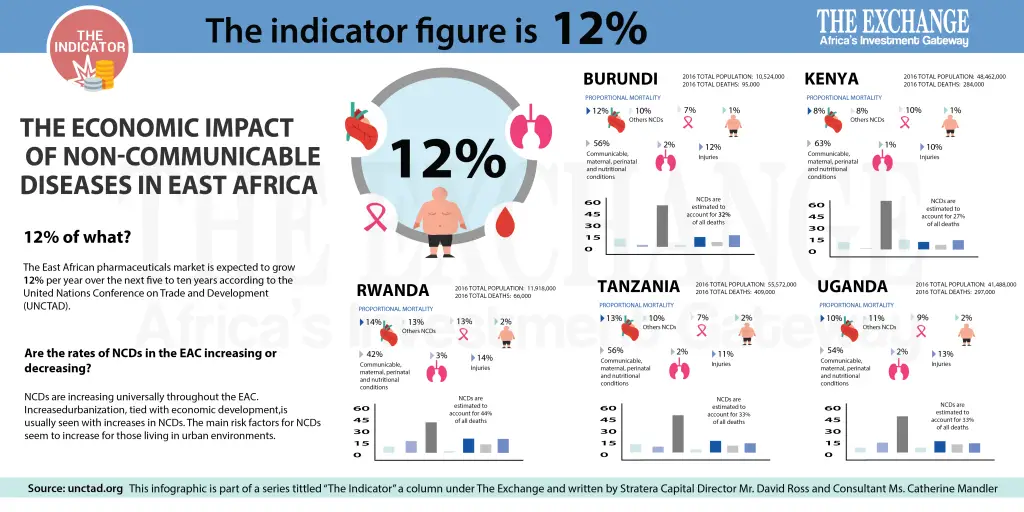Today’s indicator figure is 12%.
12% of what?
The East African pharmaceuticals market is expected to grow 12% per year over the next five to ten years according to the United Nations Conference on Trade and Development (UNCTAD). The majority of this growth will be due to non-communicable diseases (NCDs) such as heart disease, stroke, chronic kidney disease, dementia, osteoporosis, cataracts, diabetes, cancer, and other similar ailments.
How do the rates of NCDs in the EAC compare to other regions of the world?
The rates of NCDs in the EAC are approaching the rates found in developed economies such as North America and Europe. They have not matched them yet but the growth seen in recent years indicates that they will soon.
Are the rates of NCDs in the EAC increasing or decreasing?
NCDs are increasing universally throughout the EAC. Increased urbanization, tied with economic development, is usually seen with increases in NCDs. The main risk factors for NCDs seem to increase for those living in urban environments.
What impact do NCDs have on the economy of the EAC?
Without proper medical attention, NCDs can shorten lifespan, reduce the quality of life, increase sick days, and lower the age of retirement. Certain NCDs are likely to force more people into early unplanned retirement, and an increase in consumption of medical goods and services.
What is being done to better address the rise in NCDs?
NCDs are a particular challenge because the best cure for them is prevention and the best prevention for NCDs requires collaboration with the public health sector and other sectors of society. The main risk factors are unhealthy diets, sedentary lifestyles, use of alcohol, and smoking.
Both the EAC itself and NGOs are working to address the challenges increased rates of NCDs will bring.
What investment opportunities are growing with this phenomenon?
Medical services throughout the value chain from diagnostic clinics, hospitals, pharmaceutical manufacture, logistics, and pharmacies are all likely to grow from an increase in NCDs. UNCTAD suggests a $5 billion USD market in East African countries alone. Navigating the health sector can be challenging for private investors due to the market influence of government, NGOs, and working alongside businesses to serve public interests.
How can I learn more?
UNCTAD on East African Pharmaceutical Market Size – https://unctad.org/en/pages/newsdetails.aspx?OriginalVersionID=1371
About the authors:
David L. Ross is the Managing Director at Stratera Capital, Distinguished Professor of Practice at Carnegie Mellon University-Africa, and US Ambassador to the Open University of Tanzania. David is active in growing companies in Eastern and Southern Africa through angel investment, investment advisory, strategic partnerships, and executive education. Connect on LinkedIn at http://tz.linkedin.com/in/davidlross1 or at david@strateracapital.com.
Catherine Mandler is a Consultant at Stratera Capital. Connect on LinkedIn at http://www.linkedin.com/in/CatherineMandleror at catherinemandler@strateracapital.com.
